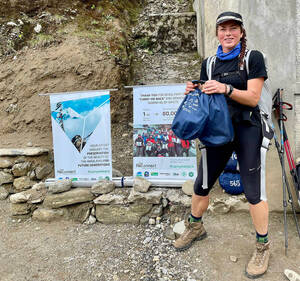Katie Conlon ’14M.A. is a researcher and videographer working in the remote Himalayan landscapes of northern India and Nepal. Her current project — Himalayas to Sea, Plastic Free — is a collaboration with National Geographic to make 20 short films documenting efforts to reduce plastic pollution in the shadow of Earth’s tallest mountain range. Conlon recently spoke from southern India after her return from the Tibetan Plateau.
What is the focus of your current work?
In my Ph.D. [work on urban and sustainability studies at Portland State University], I was focused on plastic pollution. And I’ve been in the South Asian region for the last five years now. I got really lucky that plastic has become kind of a global zeitgeist. There’s been a lot of global interest, including places like National Geographic, and so they had a specific call out around projects related to plastic pollution.
For me, that linked together a lot of the work that I’ve been doing. We all know about the problem, but I wanted something that would focus more on the solutions and the people doing really good work on the ground, so I proposed to document different initiatives and organizations across the Himalaya region.

What projects have you seen so far?
We’ve really covered a range, from small businesses to local universities and local village projects. One of the projects that we visited is in Nagaland, which is right on the border with Myanmar. . . . And this village, they decided to do a waste initiative, and through the cleanup they realized that their waste was going into the river. They realized — and this is kind of a theme — that they needed to ask deeper questions about waste. . . .
They made a very clear linkage about how their traditional culture was eroding. They’re eating more packaged food, so they wanted to start doing a zero-waste pilot project in their village. And as part of that, they started to go back and cook a lot of their traditional foods, and they made policies to start wrapping everything again in banana leaves or . . . bamboo. So, they have all these different kinds of containers that they’re making out of the traditional materials.
I like this case because it’s not just focused on waste and pollution, but they’re linking their traditional practices with the plastic reduction. So, the more they’re able to shift away from plastics, the more they’re able to bring back their traditional arts and culture and share meals together by cooking. They’re seeing this as a very holistic way to go about things.
What drew you to the issue of plastic pollution?
I saw plastic waste as the string that you pull that’s connected to so many things. Plastic is made out of fossil fuels, so it connects to the oil economy, and therefore it’s connected with climate change. And we see how it’s impacting biodiversity and animal species that are losing habitat to waste in the environment, or that are ingesting it. We also see how it’s connected to human health with the toxic additives in plastic. You can come at it from many different angles. And unfortunately, it’s universal.
What does the future of your work look like?
Coming off of a Ph.D., you’re telling stories where you’re constantly having to back things up with facts and figures and citations. But I think that when we’re working on the environment or climate change — things that affect everyone — we’re not really going to move the needle through facts and figures. Rather, I think through human storytelling, we can relate. That’s how we come to understand each other.
Just think of how many people were inspired growing up by the stories of Jane Goodall and how she was connecting with the chimpanzees, or Jacques Cousteau and how he was connecting with the underwater world. They didn’t come with a PowerPoint, breaking things down with pie charts. Those things don’t really move people. They shared what they found was meaningful with the world.
Interview by José Sánchez Córdova, a junior from Puerto Rico studying political science and journalism, who was this magazine’s fall semester intern.